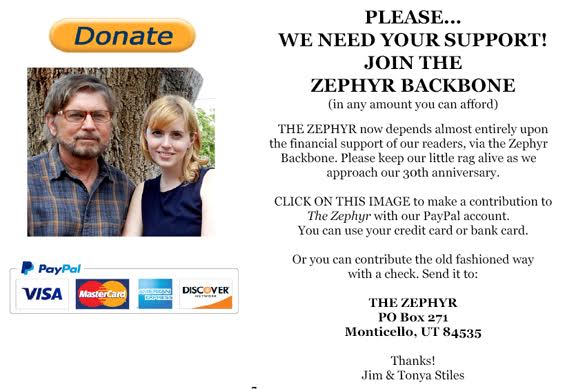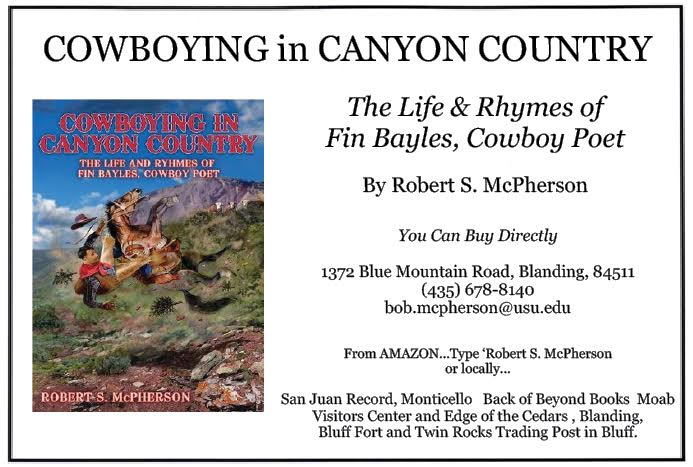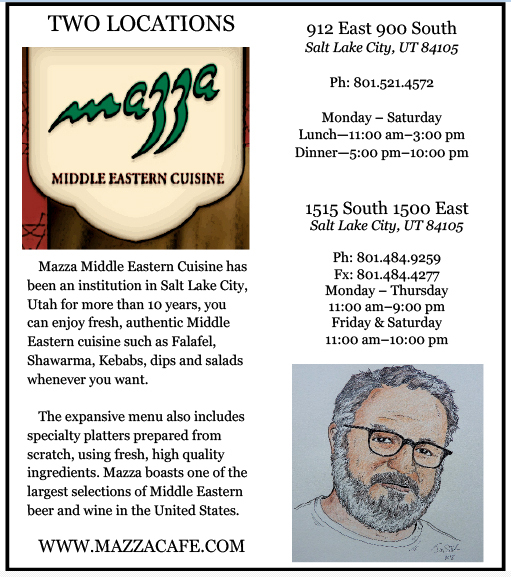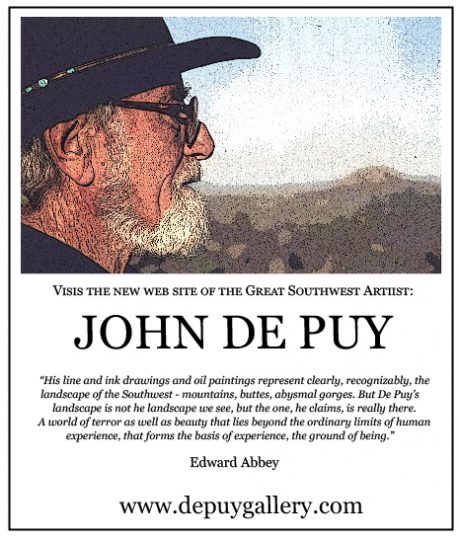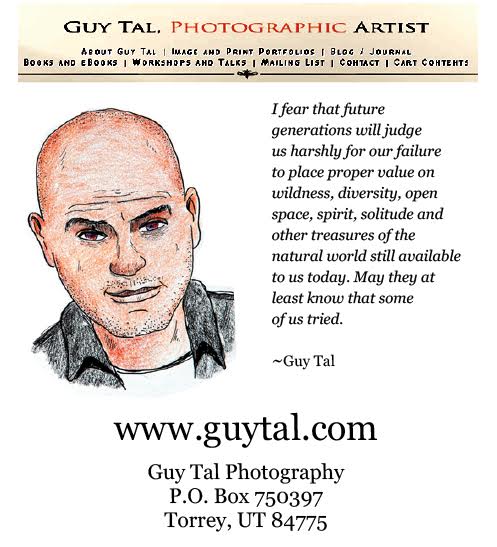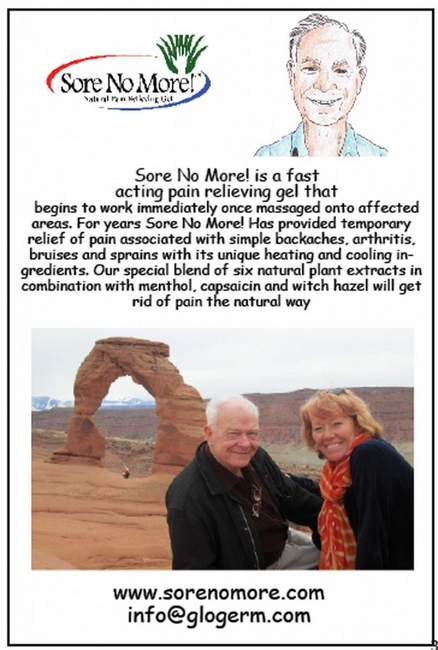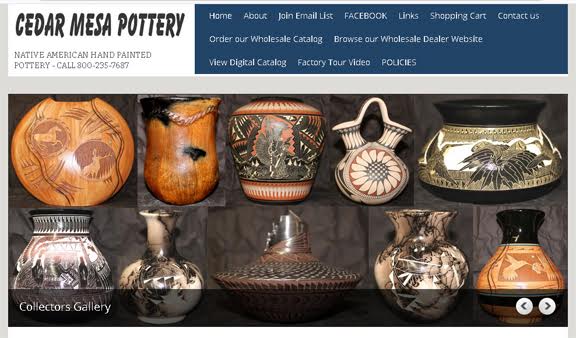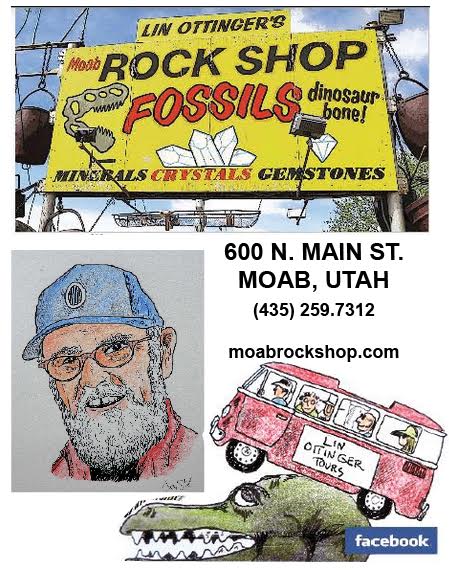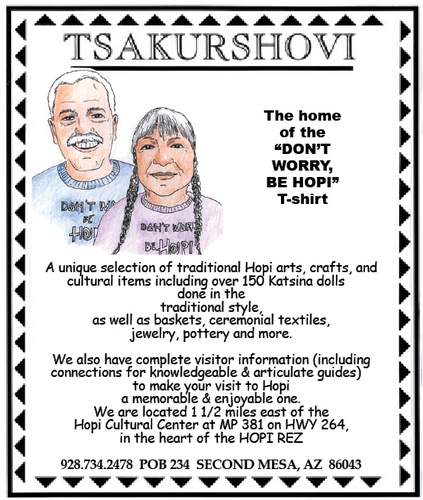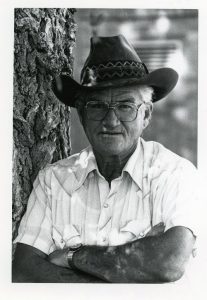
In 1956, Irving Stone published Men to Match My Mountains: The Monumental Saga of the Winning of the American Far West with a chapter named “Giants Stalk the Land.” Both titles are appropriate, in modified form, for this chapter. Here Fin tells of real personalities, with all of their bumps and warts and how they worked with cattle in the San Juan country.
These men are memorable, not because of their great deeds and lasting contribution, but because of their unique qualities and earthy approach to life and the challenges they faced. The land had its way of bringing out some of the best and worst in each one.
As with much of his poetry and prose, he either knew many of these characters or had heard stories about them from the earlier days. There really was a Billy McCabe that rode for the Carlisle outfit; Harve Williams and Jack Steel really did make a deal about shoeing a horse; and Ike McCadd is representative of many a lone hermit that wandered through the hills and desert of southeastern Utah. No doubt “poetic license” is also at play here, but through this verse and in the stories, there is a true sense of life lived in the rough and tumble occupation of a cowboy on the Colorado Plateau.
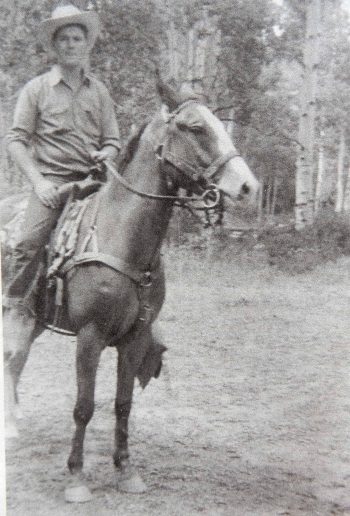
There were a lot of questionable characters that lived in this country. You wonder why they were here and if they were laying low from the law. Before the Taylor Grazing Act in 1933, a lot of shoestring operators came in too, little guys, some without even a decent bedroll. They would get into this country and make an effort at the cattle business….
Harvey Williams, an Oklahoman, was another cowboy who arrived sometime before the 1930s. I suppose Harve came immediately from Colorado with a few dozen cattle which he tried to run down on the west side of Elk Mountain, but that area had already been taken by Albert Scorup from Salina who married a local girl in the 1880s. When I first went down into the TY country, I traveled with Henry or Hank Lyman. I liked old Henry and knew Harve and understood he was hard-twisted and about half-way ornery. I didn’t know at that time that he was so prejudiced against Mormons. He began his career in San Juan by encroaching with his few cattle on Scorup’s outfit, but Al decided he would rather have old Harve in his pocket than compete. So they struck a deal where he turned his cattle in with the Scorup/Summerville outfit and took some stock in the company, making him an assistant instead of a competitor.
He became a partner for lots of hard years, hanging in there, struggling, and being frugal—a real tight wad. For example, Harve was too tight to smoke. If he ever did, he probably ground some bark off a fence post or a grape vine. His expenditures in a year might include two of those big fat books of cigarette papers for his lip. Anytime you saw old Harve, he had one of those papers on his lip to prevent sun and wind burn. Everyone was out in the sun all day so the paper kept lips from burning. Harve would make sure one paper lasted all day. I don’t know if he could make it last all night and the next day; but he would if he could. He was a real scrooge about buying groceries too, maybe some baking powder, flour, beans, rice, and a little macaroni.
That was about it and they lived on that for months at a time. Anyway, in his accounting of expenditures, there was five cents that he could not remember how it was spent. He said,”I probably squandered that,” but this was not tongue-in-check. He was serious. That’s how tight he was. If a person shot a deer and donated it to the crew, that made points with Old Harve, but he wouldn’t shoot deer, only encourage others to do it. I think the problem was he was too tight and didn’t want to buy ammunition. All the time I was around him, he didn’t have a weapon.
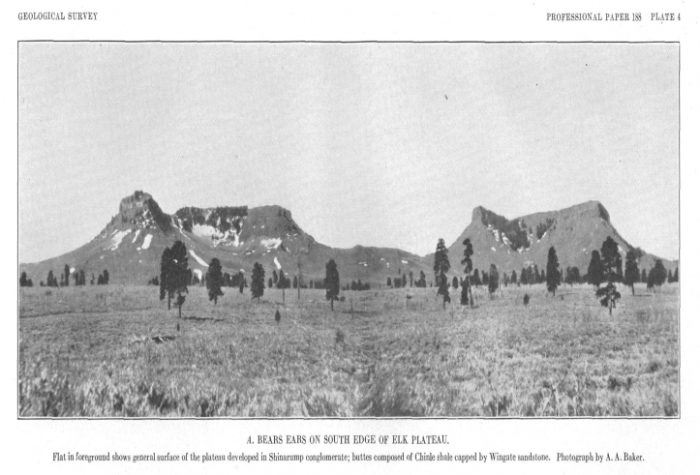
Now clothes for cowboys were a practical affair. Basic items were trousers, boots, a pair of chaps, and perhaps a Levi jacket to keep their shirts from getting so torn up. One type of coat that everyone had was called a sheepskin because it had sheepskin built in for a lining, with an outer covering of canvas-like material. It also had a big collar, large pockets, and a length that came down over your hips. A lot of men wore a good felt hat they mashed into a shape they liked then wore it until it was solid oil. When cowboys sweat around the hatband, the oil starts seeping through the felt and picks up dust. Most cowboys wore their hats for eight to ten years.
A good hat will turn a lot of rain until it gets soaked up then the water runs over your ears and down your neck.
When it came to clothes, Harve wore the same thing all of the time. He had a pair of Scowcroft and Weaver boots that were custom-made in Grand Junction. That’s what everybody wore. He also dressed in Levi pants, Levi jacket, shirt, and an old hat. The hat was so far out of shape and had been worn so many years, it was ugly. He patched his clothes and wore an old beat-up pair of chaps that were stitched up with a leather thong where a crease had rubbed through or he had torn them. After Harve married one of Scorup’s daughters, Veda, he had to start wearing underwear. She made him wear boxer shorts, so when he left town, he was sporting them. On the first night out, however, he’d shed them because he did not want to wear them out. He got complete use out of everything, but his whole outfit was scabby. I don’t know if anyone ever did much laundry in those days. I think they just wore their cleanest shirt, and forthe next occasion, just picked out their next cleanest shirt.
A Simple Matter of Identity
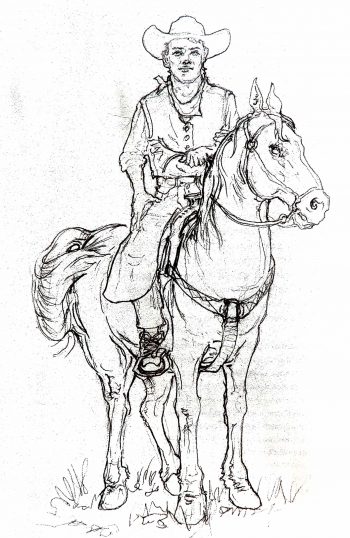
I saw on the prairie a cowboy
I could tell because of his gear
He was a-comin’ on collision angle
So I reined up and watched him come near.
He was mounted well, on a stockin’-legged chestnut
His kack manufactured long ago
His bridle of Mexican steer hide
His bit was of silver and gold.
His head crowned with a four beaver Stetson
His vest was of brown kangaroo
His legs cased in fringed shotgun leggings
His breeches that showed were dark blue.
His spurs were big roweled in Southwest pattern
His brown gloves with a finger showed through
His shirt western cut in floral pattern
On his foot sat a blue jogging shoe.
I was amazed and he caught my expression
Hell, blue shoes are fine or try red;
It was none of my business what he hung spurs on,
But I reacted and here’s what he said:
“There’s an invasion a-stalkin’ us cowboys
I’ve adjusted, I’m gonna survive her.
If it costs me my boots–I’ll do without leather,
But I won’t be mistook for a truck driver.
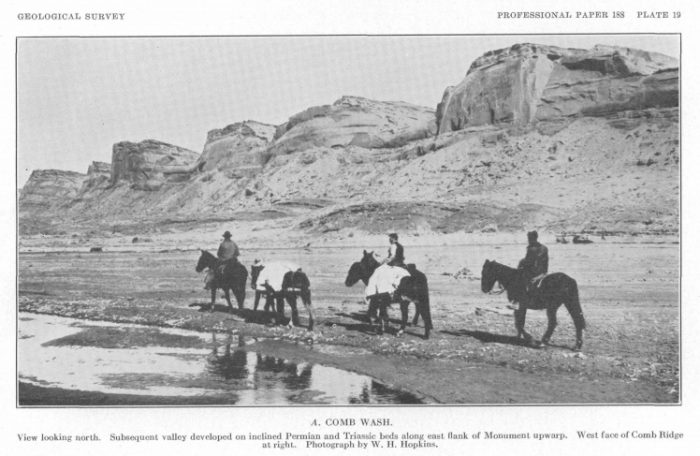
Harve Williams used to stand in one stirrup and always had a sore-backed horse. He rode like that all the time, with more weight shifted to one side. When a man rides, he has a foot in each stirrup with probably half his weight on his hind end and a quarter on each leg. If a rider hind end gets sore, he tends to put more weight on the stirrups or stands up and puts all his weight on the stirrups.
This is alright but some people are sloppy and hang more on one side than the other. It may be comfortable for them but it is not for the horse. Harve always rode a good horse, but he was a terrible rider. He would hang in his big square stirrup on a heavy, square rig saddle that weighed about 60 pounds and never sat up straight. You could see the puss run out from under that old saddle. The horse would get a “pie” on his back and Harve would never let it heal or take care of it. As long as the horse hauled him, he’d let it. He had several horses to trade around but his best horse was always in tough shape because he wasn’t kind. He wasn’t kind to cattle or cowboys either. A good cowboy won’t hurt a horse, but a sloppy one, like Harve, can be totally inconsiderate of horse flesh. My dad wanted to whip guys who did that, make them sit straight in the saddle, and not abuse the horse.
Harve treated the men who worked for him about the way he treated his clothes and horses. Someone asked him, maybe this was in the 1930s, how much money he had drawn against the company that year. Harve told him he took $2 cash and turned the rest back forstock. He said, “I took two dollars out and I still got one,” then proceeded to very carefully account for the expenditure of the dollar. He had bought three pairs of socks for two bits a piece.
Buying tobacco for smoking was just too expensive. In those days, Bull Durham came with a little package of papers glued right on the bag, so that the men who rolled their own could just pull a paper right out of the bag. Prince Albert, which was more of an aristocratic tobacco, came in a can and cost about twice as much. It didn’t come with papers, so the smoker had to buy his own to roll a cigarette.
Around 1940, we started hearing quite a bit about the O. M. Franklin Company, which sold medications for cattle to prevent blackleg and other illnesses. It got pretty productive to vaccinate and stave off these cattle diseases, but Old Harve, being the boss of the TY outfit, was pretty slow taking on this new thing. It was about 1945 when people started vaccinating which was a new experience for him, so he was reading the instructions about how to use the syringe, how to take care of it, and how it all worked. Someone observed him one morning at Twin Springs, the TY headquarters on south Elk Mountain. During the last year, an old cow had dropped a cow chip which formed a dish in the center. A man said Harve was sitting up there one morning with a new syringe in his hand sucking the rain that had collected in the indentation and squirting it out over this cow pie. He asked Harve what he was doing and received the answer that he was sterilizing the needle just like the instructions said.
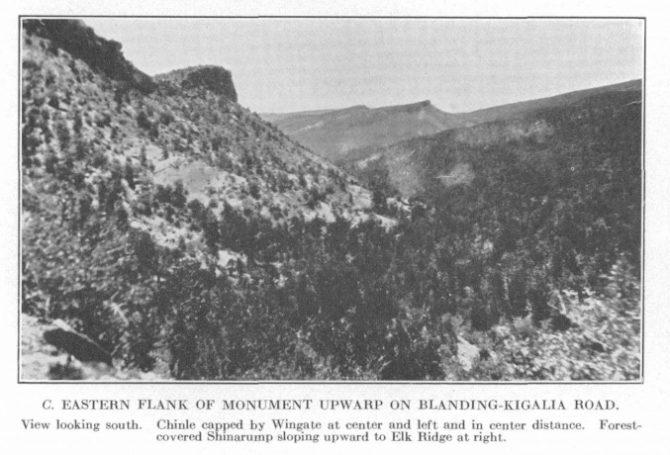
* * *
Some of the cowboys said that later Harve went kind of goofy. I find that hard to accept, but they say he stood off a posse that came from town. There were a lot of wild things being rumored against him. They came to take him in for medical attention and it is said he stood them off with a Winchester, which I don’t believe. I never knew him to own a Winchester and I know darn good and well that he would never buy bullets. He was just too tight.
THE BURIAL OF BILLY McCABE
The snow was deep; the wind was raw
As it whistled down the line,
With frozen and intensive gloom
Beneath the ancient pines.
There where only weeks before
Had basked in autumn slumber,
Revealed now not a vestige
Of the glorious Indian summer.
The grand ranch house’s environs
Where few appeared but idle,
A dream in hibernation
The Royal Ranch of “Carlisle”
But in those cloistered precincts
In the bunkhouse, barns, and livery
Was humanity on an urgent quest
Of anticipated leisure activity.
The cowboys of this frozen realm
All able, stout and hardy
Were in pursuit of not cold cows
But a blowout Christmas party.
In kegs and crocks of earthenware
Of ingredients vintage and new
With sugar and grain and more invested
In fermenting homemade brew.
If there were ten to participate
In industry this is thrifty
They’d hedge their bets, to be ready
They’d prepare for fifty.
When the grand occasion finally came
Convened the special few
Uncorked the first bung-stopper
.
Broke out the noxious brew.
Among that crew of Carlisle boys
Was a tall and skinny cuss
Who when he commenced to drink
Would make no end of fuss.
This puncher’s name was Bill McCabe,
Who’d get mean and rank and drunk;
So the cowboys saved him from himself,
They tied him to his bunk.
The rotgut whisky lasted well
The party had great luck,
It was about three days or more
B’fore the cowboys sobered up.
Then in the corner of the bunkhouse
All trussed up in bed,
There laid the corpse of Bill McCabe,
Cold and stiff and dead.
Billy had simply been forgot
When put to such ill use,
All those boys had figured
Somebody else would turn him loose.
There wasn’t much they could do now
For Billy the shape he’s in
They’d just pool their efforts
And make it up to him.
Two of them cowboys lit for town
To get pants and a shirt and socks,
Then they’d find the carpenter
To build ole Bill a box.
They found there was a coffin
All padded up and real,
They bid five dollars for it
.
And really got a deal.
Now how to get the casket back
They didn’t really know.
So they roped it like they would a steer
And towed it ‘cross the snow.
Old Bill got scrubbed and currycombed,
They dressed him up a bit,
But when they laid him in the box
The sucker wouldn’t fit.
Nobody’d thought to measure
Their sad deceased cohort,
‘Til they found their bargain casket
Was about a foot too short.
Now Bill was gonna use that box
Regardless of his stance,
There’s no use savin’ their bargain box
They might not get second chance.
They finally settled on a plan
It took a little while,
So they carried old Bill’s carcass
Out to the big wood pile.
They had to get a move on
Before his corpse might freeze,
They rolled up Bill’s new Levis
‘N chopped ‘im at the knees.
They put old Bill back in his box
Tenderly with love,
And durned, but old Bill looked good
It fit him like a glove.
By choppin’ both his legs off,
They solved a problem — true.
Tradin’ big for little ones
.
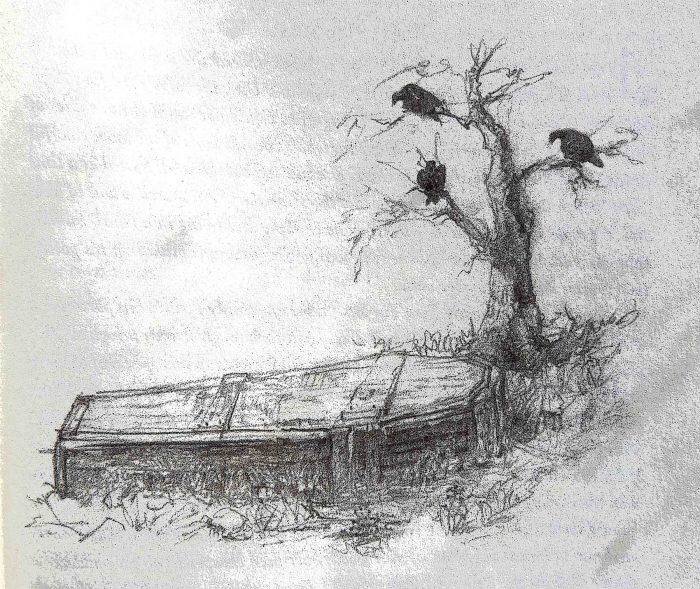
Now what they had was two.
They done a bunch of figurin’
And couldn’t see no harm
To tuck each cold and rigid foot
‘Neath each cold and rigid arm.
When they finally got him ready
He really looked quite fit,
In his brand new store-bought clothes
And toes in his armpit.
They nailed the coffin lid down tight
And at a solemn pace,
They drug ‘Ole Billy
‘cross the snow
To his final restin’ place.
They dug him out a pretty grave,
They’d be last to let him down.
But they only dug her four feet deep
Then stopped at frozen ground.
They did for Bill the best they could,
Their job was cold and slow,
Then they tucked him in real cozy
‘Neath ’bout eight feet of snow.
They left him with their solemn oath
That they’d be back in May,
But the spring was late and busy
So he got postponed each day.
The sun got warm and melted snow
The cowboys found excuse
And the nails in Bill’s fast warpin’ box
Started poppin’ loose.
Now the crows and magpies
Their daily flight would bend
To pass the spot where Bill reposed
.
Like he’d been a prior friend.
Bill had always liked the birds,
Of quail had many good fill —
And as it happened to turn out
The birds, they all liked Bill.
Now this brief infatuation
Turned out to be a blast
But Bill, he soon ran out of stuff
To really make it last.
Cowboys court convenience
And still they demonstrate success
But share credit with their feathered friends
Who’ll help out in distress.
Each traveler helped to build the West,
Yet some paid higher dues,
With little credit or recourse
They failed to make the news.
To view the past in retrospect
There was many a practical solution,
Still it must be agreed, that :Billy McCabe
Made a very personal contribution.
Bob Mcpherson is Full Professor of History at Utah State University, Blanding Campus. He has published extensively about the Four Corners area, especially its history and cultures, specializing in southeastern Utah and its Native American populations. His other works concerning this region and its people include Fighting in Canyon Country: Native American Conflict, 500 AD to the 1920s (Dog Ear Publishing); Comb Ridge and Its People: The Ethnohistory of a Rock (Utah State University Press); and Life in a Corner: Cultural Episodes in Southeastern Utah, 1880-1950 as well as Mapping the Four Corners: Narrating the Hayden Survey of 1875 (both by University of Oklahoma Press.) Click Here to find “Cowboying in Canyon Country” on Amazon.
To comment, scroll to the bottom of the page.
Don’t forget the Zephyr ads! All links are hot!
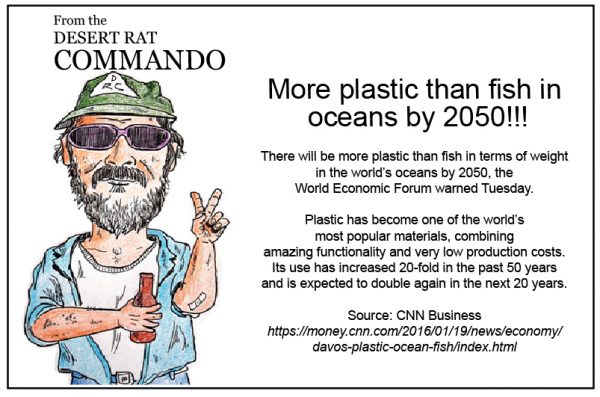
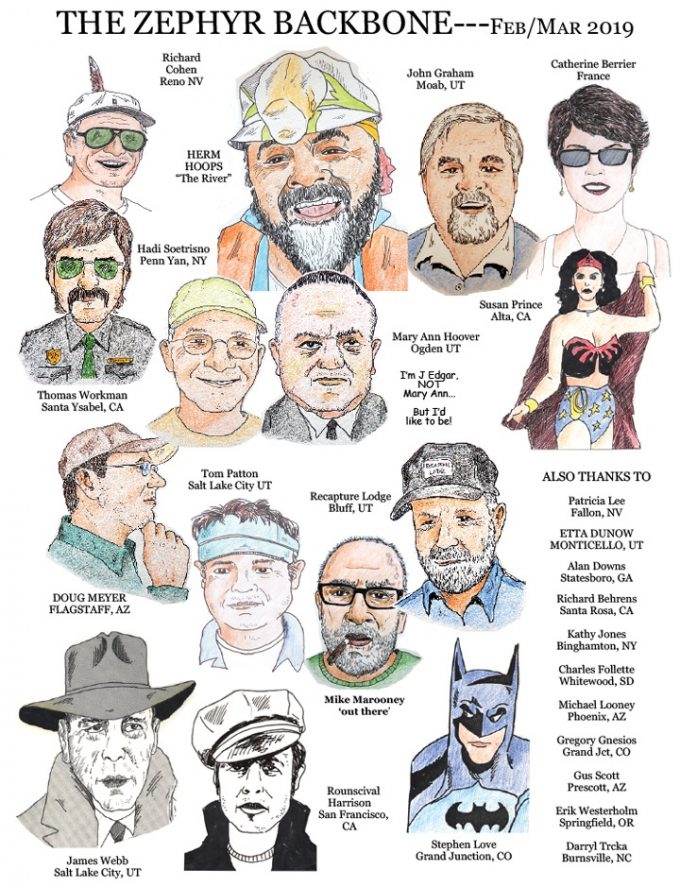
*Note: The Cartoonist screwed up. In a subconscious attempt to escape the world’s news, he changed one of our Backbone Member’s names from “Michael” to “Richard” Cohen. Sorry, Michael. We know you’re a way better guy than that infamous Michael Cohen and we beg your forgiveness.

